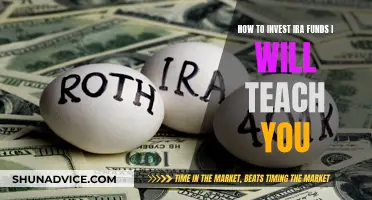
Blockchain ETFs are a great way to invest in blockchain technology without the risks associated with the volatile cryptocurrency market. Blockchain is a decentralised, incorruptible digital ledger that facilitates and records transactions. It is best known as the technology that underpins cryptocurrencies like Bitcoin and Ethereum. Blockchain ETFs are funds that invest in companies involved with the transformation of business applications through the development and use of blockchain technology. They also invest in companies that support the industry. Blockchain ETFs are a great way to gain exposure to the emerging technology.
What You'll Learn

Top blockchain ETFs by assets under management
Blockchain ETFs are funds that invest in companies involved with the transformation of business applications through the development and use of blockchain technology. They also invest in companies that are developing new blockchain applications, crypto mining, and crypto exchanges.
Amplify Transformational Data Sharing ETF (BLOK)
The Amplify Transformational Data Sharing ETF is the most prominent blockchain ETF on the market. Launched in January 2018, it was the first exchange-traded fund dedicated to blockchain technology. BLOK is an actively managed fund that selects global companies developing and applying blockchain technologies. Its top holdings include Core Scientific Inc, Galaxy Digital Holdings, and MicroStrategy Inc. As of September 25, 2024, BLOK had an expense ratio of 0.76% and assets under management of $702 million.
Siren Nasdaq NexGen Economy ETF (BLCN)
The Siren Nasdaq NexGen Economy ETF owns global companies supporting the development and research of blockchain technology. Its top holdings include MicroStrategy, Coinbase Global, and Block Inc. As of September 25, 2024, BLCN had an expense ratio of 0.68% and assets under management of $63 million.
First Trust Indxx Innovative Transaction & Process ETF (LEGR)
The First Trust Indxx Innovative Transaction & Process ETF offers exposure to a global portfolio of companies with varying degrees of involvement in blockchain technology. Its top holdings include Intel, JD.com, and PayPal Inc. As of September 25, 2024, LEGR had an expense ratio of 0.65% and assets under management of $105 million.
Bitwise Crypto Industry Innovators ETF (BITQ)
The Bitwise Crypto Industry Innovators ETF is a passively managed fund that tracks the performance of the Bitwise Crypto Innovators 30 Index, which includes 30 stocks of companies heavily involved in cryptocurrency markets. As of April 2023, BITQ had an expense ratio of 0.85% and assets under management of $126 million.
Global X Blockchain ETF (BKCH)
The Global X Blockchain ETF invests in global companies participating in blockchain activities like digital asset mining and integration. Its top holdings include TeraWulf Inc, Mara Holdings Inc, and Iris Energy LTD. As of September 25, 2024, BKCH had an expense ratio of 0.50% and assets under management of $151 million.
These blockchain ETFs provide investors with exposure to the rapidly evolving world of blockchain technology and its growing list of applications.
Reporting Inherited Investment Funds: A Step-by-Step Guide
You may want to see also

How blockchain ETFs differ from crypto ETFs
Blockchain ETFs and crypto ETFs differ in several ways. Here's a detailed overview:
Focus and Exposure
Blockchain ETFs offer diversified exposure to the broader blockchain industry, including sectors like finance, supply chain management, and healthcare. They focus on companies that work with blockchain technology and invest in the stock of these companies, rather than in cryptocurrencies directly. Blockchain ETFs provide a way to invest in the growth of blockchain technology without being exposed to the price volatility of a specific cryptocurrency.
On the other hand, crypto ETFs provide more direct exposure to the price movements of specific cryptocurrencies, like Bitcoin or Ethereum. They track the price performance of cryptocurrencies by investing in portfolios linked to these instruments. Crypto ETFs allow investors to speculate on cryptocurrency prices without directly owning the digital assets.
Underlying Assets
Blockchain ETFs invest in the stocks of companies that are developing or using blockchain technologies. These companies can include crypto exchanges, crypto mining companies, and developers of new blockchain applications. Blockchain ETFs tend to have a broader focus and invest in a wider variety of assets.
Crypto ETFs, on the other hand, can either hold cryptocurrencies directly (spot crypto ETFs) or invest in futures contracts linked to the performance of cryptocurrencies (crypto futures ETFs). Spot crypto ETFs face greater regulatory hurdles due to concerns about investor risk. Crypto futures ETFs do not hold the underlying cryptocurrencies but track their price through futures contracts.
Risk Profile
Blockchain ETFs are generally considered less risky than crypto ETFs. Blockchain technology has gained interest from major companies and is not under heightened scrutiny by regulatory agencies. Blockchain ETFs are relatively stable compared to the volatility of the crypto market, as they are not directly exposed to cryptocurrency price swings.
Crypto ETFs, however, are subject to the dramatic price swings and high volatility of the crypto markets. They also carry the risk of tracking error, especially for ETFs that depend on futures contracts, as the prices may not always duplicate the moves of the underlying digital token.
Regulation
Blockchain technology is not banned or under the same level of regulatory scrutiny as cryptocurrencies. Blockchain ETFs primarily track the stock market prices of companies invested in blockchain technology and are, therefore, less affected by regulations specific to cryptocurrencies.
Crypto ETFs, on the other hand, have faced regulatory challenges and have only recently been approved by the Securities and Exchange Commission (SEC) in certain jurisdictions. The regulatory status of cryptocurrencies remains unclear in some jurisdictions, and crypto markets are often associated with concerns about fraud, market manipulation, and criminal activities.
Mutual Fund Inheritance: Where to Input Tax?
You may want to see also

Blockchain ETF expense ratios
Blockchain ETFs are a great way to gain exposure to blockchain technology without directly investing in cryptocurrencies. When choosing a blockchain ETF, it is important to consider the expense ratio, which represents the annual fees associated with managing the fund. Here is a detailed overview of some popular blockchain ETFs and their expense ratios:
Amplify Transformational Data Sharing ETF (BLOK)
BLOK is the most prominent blockchain ETF on the market. This actively managed fund selects global companies that develop and apply blockchain technologies. As of September 25, 2024, BLOK had an expense ratio of 0.76% and assets under management of $702 million.
Siren Nasdaq NexGen Economy ETF (BLCN)
BLCN owns global companies supporting the development and research of blockchain technology. As of September 25, 2024, BLCN had an expense ratio of 0.68% and assets under management of $63 million.
First Trust Indxx Innovative Transaction & Process ETF (LEGR)
LEGR offers exposure to a global portfolio of companies with varying degrees of involvement in blockchain technology. As of September 25, 2024, LEGR had an expense ratio of 0.65% and assets under management of $105 million.
Bitwise Crypto Industry Innovators (BITQ)
BITQ holds an index of 30 crypto companies from around the globe, with many deriving more than 75% of their revenues from crypto assets. As of September 25, 2024, BITQ had an expense ratio of 0.85% and assets under management of $126 million.
Global X Blockchain ETF (BKCH)
BKCH invests in global companies participating in blockchain activities like digital asset mining and integration. As of September 25, 2024, BKCH had an expense ratio of 0.50% and assets under management of $151 million.
It is important to note that the expense ratios and assets under management for these blockchain ETFs may change over time, so be sure to check the most recent data before making any investment decisions.
ISA Funds: A Guide to Smart Investing
You may want to see also

Blockchain ETF performance
Blockchain ETFs are a great way to invest in the fast-growing crypto market without directly investing in cryptocurrencies. Blockchain ETFs invest in companies that use or develop blockchain technology, or in companies that are set to benefit from the increased adoption of blockchain technology.
As of September 25, 2024, the blockchain ETFs with the most assets under management were:
- Amplify Transformational Data Sharing ETF (BLOK)
- Siren Nasdaq NexGen Economy ETF (BLCN)
- First Trust Indxx Innovative Transaction & Process ETF (LEGR)
- Bitwise Crypto Industry Innovators (BITQ)
- Global X Blockchain ETF (BKCH)
The performance of these ETFs has been mixed. As of December 1, 2022, the three top blockchain funds, ranked by one-year trailing total return, were:
- First Trust Indxx Innovative Transaction & Process ETF (LEGR) with a performance of -12.0% over one year
- Siren Nasdaq NexGen Economy ETF (BLCN) with a performance of -48.0% over one year
- Amplify Transformational Data Sharing ETF (BLOK) with a performance of -64.0% over one year
These funds have underperformed the market in the last year, although the use of blockchain technology is rising in industries such as logistics, payments, healthcare, and tech. The ETFs fell partly because blockchain technology is still closely associated with cryptocurrencies, and the collapse of the FTX exchange and Bitcoin's plunge to a two-year low negatively impacted the performance of these funds.
It is important to note that blockchain ETFs are subject to additional sources of volatility, such as market pricing valuations, changes in investor sentiment, and government regulation.
Axis Quant Fund: A Smart Investment Strategy
You may want to see also

Top blockchain ETF holdings
Blockchain ETFs are funds that invest in companies involved in the transformation of business applications through the development and use of blockchain technology. They also invest in companies that use blockchain technology in their operations. Here are some of the top blockchain ETF holdings:
Amplify Transformational Data Sharing ETF (BLOK)
BLOK is the most prominent blockchain ETF on the market. It is an actively managed fund that selects global companies developing and applying blockchain technologies. Its top holdings include Core Scientific Inc (CORZ), Galaxy Digital Holdings (GLXY), and MicroStrategy Inc (MSTR). BLOK has an expense ratio of 0.76% and assets under management of $702 million.
Siren Nasdaq NexGen Economy ETF (BLCN)
BLCN owns global companies supporting the development and research of blockchain technology. Its top holdings include MicroStrategy (MSTR), Coinbase Global (COIN), and Block Inc (SQ). BLCN has an expense ratio of 0.68% and assets under management of $63 million.
First Trust Indxx Innovative Transaction & Process ETF (LEGR)
LEGR offers exposure to a global portfolio of companies with varying degrees of involvement in blockchain technology. Its top holdings include Intel (INTC), JD.com (JD), and PayPal Inc (PYPL). LEGR has an expense ratio of 0.65% and assets under management of $105 million.
Bitwise Crypto Industry Innovators ETF (BITQ)
BITQ holds an index of 30 crypto companies from around the globe, with 75% of their revenues derived from crypto assets. Its top holdings include MicroStrategy Inc (MSTR), Mara Holdings Inc (MARA), and Coinbase Global (COIN). BITQ has an expense ratio of 0.85% and assets under management of $126 million.
Global X Blockchain ETF (BKCH)
BKCH invests in global companies participating in blockchain activities like digital asset mining and integration. Its top holdings include TeraWulf Inc (WULF), Mara Holdings Inc (MARA), and Iris Energy LTD (IREN). BKCH has an expense ratio of 0.50% and assets under management of $151 million.
Understanding New Fund Offers: A Guide to Smart Investing
You may want to see also
Frequently asked questions
Blockchain ETFs are exchange-traded funds that hold a basket of publicly traded companies exposed to blockchain technology. They tend to invest in a wider variety of assets than bitcoin or crypto ETFs, which focus more narrowly on tracking the price of individual cryptocurrencies.
Here are some examples of blockchain ETFs:
- Amplify Transformational Data Sharing ETF (BLOK)
- Siren Nasdaq NexGen Economy ETF (BLCN)
- First Trust Indxx Innovative Transaction & Process ETF (LEGR)
- Bitwise Crypto Industry Innovators ETF (BITQ)
- Global X Blockchain ETF (BKCH)
Blockchain ETFs provide an opportunity to invest in the fast-growing crypto market without directly investing in cryptocurrencies. They also offer a less risky way to gain exposure to the industry as they invest in dozens or even hundreds of stocks, providing plenty of diversification in a single fund.
Similar to other thematic investments, blockchain ETFs tend to come with additional sources of volatility. These risks can be market-related, such as pricing valuations or sudden changes in investors' sentiment. They can also be macro risks, such as additional government regulation.







